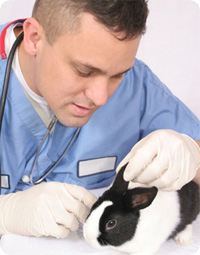RABBIT Diseases

RABBIT Parasites
Mites, Fleas, Worms and other parasites
Mites
Mites typically infest Rabbit’s ears causing a black or brown discharge to appear. The ear tissue can be come raw and irritated and occasionally the skin sores can move out of the ears and on to the rabbit’s head. Mites are typically treated through liquid drops, but recent research shows that injecting medication can help speed the healing process.
Fleas
Fleas are blood sucking parasites that, in large infestations, can cause anemia. Veterinarians generally do not recommend the use of flea collars on rabbits to control fleas. To treat fleas, use a commercial flea powder designed specifically for rabbits or cats. Treat your rabbit as directed on the flea powder packaging so as to not over powder the rabbit – rabbits, like cats, habitually lick themselves and can become poisoned by the flea powder if it is not used as directed.
Maggots
Rabbits can become infected with maggots if they are not properly cleaned, or if through disease or age they become sedentary. Feces and urine up close to the skin are easy targets for flies to lay eggs in. When the eggs hatch, the maggots burrow into the rabbit’s skin releasing harmful toxins into the blood stream. The toxins in the blood create an emergency situation that requires the immediate attention of a veterinarian.
Mange
Mange is caused by the Cheyletiella mange mite, a skin parasite that causes a dandruff-like condition causing itching and hairloss. Medicated shampoos work well to control and cure mange mites, although severe cases may require an injected medication given by a veterinarian.
Ciccodioses
Ciccodioses is a liver and intestinal disease caused by a single celled parasite. Rabbits typically contract this disease by consuming food or water that has been contaminated with feces. Physical response to this type of disease depends on a number of factors and can be manifest in a number of ways. Rabbits infected with ciccodia can experience blood in the feces and diarrhea, and become dehydrated and experience weight loss. Pet owners should seek the help of a veterinarian to treat this illness.
RABBIT Diseases
Hairballs
Rabbits that frequently lick and groom themselves can ingest hair that forms into a solid mass in their stomach. The formation of a hairball in the stomach gradually increases over time until it blocks regular digestion and prevents adequate nutrition. Rabbits with a large mass in their stomachs will have less “room” in their stomachs to hold food and the blockage will prevent optimal nutrient absorption and bowel movements. Over time, afflicted rabbits will grow weak, eat less, lose weight and eventually die.
Unlike cats, rabbits cannot vomit and therefore cannot push up or pass through the hairball mass. Removing a hairball from a rabbit’s stomach generally requires veterinary surgery.
To prevent hairballs from forming in a pet rabbit’s stomach, rabbits should be brushed regularly and fed over the counter intestinal lubricants. Some veterinarians believe that a regular diet of fresh fruits (such as pineapple and papaya containing the digestive enzyme papain) may help prevent hairballs.
Cancer
Uterine cancer is the most common type of cancer seen in domestic rabbits. Early signs of uterine cancer in breeding rabbits involve decreased fertility, smaller litter sizes, abortions and stillbirths. Additionally, pet rabbits will experience intermittent bleeding from the vulva - often mistaken for blood in the urine. Because this type of cancer is so common, pet female rabbits should be spayed at 4 1/2 months of age.
| |
Other Categories
RABBIT Pet Care
RABBIT Health Information
RABBIT Diseases
RABBIT Kits
RABBIT Products
Main Categories
DOGS
CATS
HORSES
BIRDS
RABBITS
HAMSTERS
MICE AND RATS
GUINEA PIGS
FISH
|

